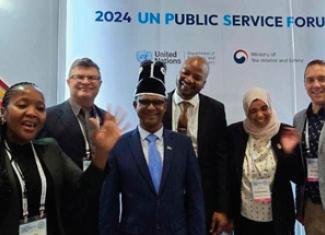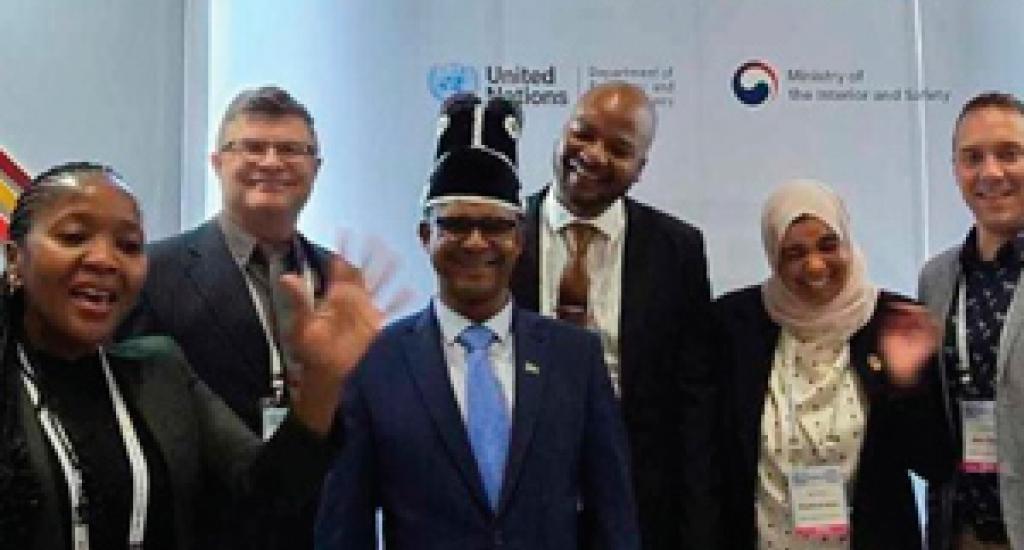Western Cape DG
shares secret recipe for effective governance

Successive Auditor-General of South Africa (AGSA) reports and other monitoring bodies continue to shine a light on the good governance of Western Cape Government (WCG) departments, entities and municipalities.
In an effort to understand the provincial government’s recipe for success, Public Sector Manager (PSM) magazine spoke to the provincial government’s Director-General (DG) Dr Harry Malila.
This was on the back of the province earning the coveted Public Service Innovation Award from the United Nations Public Service Forum at a ceremony held in Incheon in South Korea.
Malila said the province’s leaders placed emphasis on the efficient and effective delivery of services, with a strict zero-tolerance policy towards corruption and maladministration.
“The administration of the Western Cape is distinguished by its dedication to transparency and integrity at all levels.
The province's leaders consistently prioritise good governance, ensuring that ethical standards are maintained,” he said.
Additionally, the province has established robust accountability frameworks to guarantee that public funds are utilised appropriately.
“The prompt identification and resolution of any issues are facilitated by regular audits, performance reviews and continuous monitoring,” Malila said.
The WCG has frequently been commended by the AGSA for its proactive approach to addressing audit findings, with numerous municipalities promptly instituting corrective measures to improve service delivery.
“Municipalities are encouraged to engage citizens in the decision-making process, which promotes accountability and trust. ”
Integrated governance
Malila attributed the success of municipalities to the Provincial Treasury, which offers financial supervision, guidance and support to municipalities.
“This encompasses support for financial reporting, budgeting and adherence to the Municipal Finance Management Act (MFMA),” he said.
Above this, the DG told PSM magazine that Provincial Treasury collaborates with municipalities to create and execute financial recovery strategies when necessary, guaranteeing that any financial difficulties
are promptly and proficiently resolved.
He said the early identification of potential financial hazards is facilitated by the continuous engagement between the Provincial Treasury and municipalities, which enables the implementation of timely interventions.
This was verified by the last AGSA’s MFMA governance report, which revealed that the provincial government’s support initiatives contributed to 26 municipalities (87%) submitting good-quality financial statements that required no material adjustments.
Above this, Malila said the provincial government implements best practices and innovation to ensure effective service delivery.
On transparency and community engagement, the DG said the WCG's approach is characterised by active community engagement and transparent governance.
Municipalities are encouraged to engage citizens in the decision-making process, which promotes accountability and trust. Communities are kept informed, and scrutiny is enhanced through consistent public reporting on service delivery outcomes and financial performance,” he explained.
Strategic procurement and supply chain management
The WCG, he said, emphasises improving the ease of doing business, reducing red tape, and enhancing procurement processes. This involves a shift toward digital transformation and technology-enabled supply chain management practices to improve efficiency, transparency, and accountability.
“The WCG aims to use public procurement strategically to drive value for money, efficiency and economic development, particularly in response to the economic challenges,” he said.
Assurance and oversight
Malila said a combined assurance approach, including integrating governance, risk management and assurance processes was critical to ensure effective oversight and continuous improvement in governance practices.
The office of the Premier and Provincial Treasury ensure effective and efficient public financial management by providing oversight, support and guidance to departments, public entities and municipalities to create strategies.
“This award signifies that the Western Cape has implemented groundbreaking practices and policies, enhancing the quality, efficiency and effectiveness of public services through technology, citizen
participation, and streamlined processes.
“It demonstrates our commitment to prioritising the needs and well-being of our citizens, ensuring accessibility, transparency, responsiveness, and accountability,” Malila said.
The award also recognised the province’s achievements in integrating digital technologies into governance, leveraging the digital government strategy approved in 2017, strengthening cybersecurity, and improving service delivery.
30 years of democracy
With the country marking 30 years of democracy, Malila reflected on the milestones the province has achieved in the last three decades, ranging from realising inclusive development, economic stability, good governance, energy resilience, and its ability to respond to disasters.
While notable progress had been made to improving the lives in the province, the DG conceded that there were areas of concern that required focused attention. Chief among these were stubbornly high crime and unemployment rates. To address unemployment, Malila said the province has developed a Growth for Jobs
strategy that aims to achieve an annual growth rate of between 4% and 6% by 2035, with the potential to create over 600 000 jobs.
The strategy emphasises the role of the private sector in job creation, while the government’s role is to create an enabling environment by ensuring access to essential resources including energy, water, infrastructure, skills, and technology.
He said crime and violence remain significant challenges concentrated in hotspots across the province.
Doing more with less
In this regard, the province’s efforts are guided by the Western Cape Safety Plan, a data-centred, evidence-based approach to addressing crime.
Like its counterparts across the country, the province finds itself saddled with budget cuts.
“Reduced funding from national government and increased demand for the core services are a growing threat to the improvement of the Human Development Index of the province,” he explained.
He said the provincial government will continue to fight for its fair share of the national revenue to ensure that residents are not unduly disadvantaged. He added that the province consistently formulates a budget that responds to mounting service delivery demands within a reduced fiscal envelope.
“At the centre of decision-making are the 7.5 million residents of this province, our vulnerable communities and future generations. Between 2019 and 2024, the Western Cape’s population expanded on average by 1.6% per annum to 7.5 million in 2024,” explained Malila.
Given the increased need to protect essential services, the WCG’s challenge has been to do even better with less.




